- Home
- Brand, Max
Mountain Riders Page 2
Mountain Riders Read online
Page 2
3
THE RED BULL
IT took Derry five days to get to Thompson’s Creek, for it was ‘way up in the Blue Water Mountains. It took him two days of wandering about through Thompson’s Creek before a travelling cowpuncher gave him the location of the split rock. It was not a very big affair. It was no larger, say, than a small house, and it was cleft right in two, with the halves leaning quite away from one another and looking as though they would fall utterly apart.
He was vigorously introduced to the scene by a red bull. The bull had scars along its flanks which proved that it had been thrashed by a rival not long before, and had been gored before it could dodge away from the conqueror. And there was a store of malice lodged in its heart that sent it high-tailing straight for the rider.
Tom Derry dodged that bull twice. If it had not been a splendid specimen he would have been tempted to shoot it down, but as it was, he made the pony run to save his life.
The worst of that manœuvre was that the moment the mustang started running, it fell into a panic, and headed blindly for a high, barbed-wire fence. Tom Derry managed to twist the mustang aside from that terrible danger, but the horse seemed to think that its master was holding it so that the bull could catch up from the rear.
So it tied itself in two or three figure eights, double-bucked a few jumps, and plastered Tom Derry against the barbed-wire fence.
There was no particular malice in that horse, and if Tom had been a bit more on his guard, the bronco probably would not have got him off. But as it was, he hung head down on the fence, with only a blurred realization that the red bull was plunging straight at him, head lowered.
The head dropped still lower. The bull dug its horns into the ground and turned a complete somersault, barely missing the body of Derry with its flinging heels. Then it lay still, and Derry vaguely realized that he had heard the report of a rifle in the distance.
He got a good many deep scratches before he managed to disentangle himself from the fence. Then, standing up, he saw a rider cantering toward him — still a good two hundred yards away!
Derry looked at the bull and saw where the little rifle bullet had bored to the life through the shoulder. It had been a neat shot; a snap shot and an excellent one. Derry, with the world of blue and bright still spinning a little before his eyes, realized that his life had been saved.
He turned from the bull and found the rider dismounting beside him from a tall black mare that had all the long, stretching lines of good blood. He was a man of fifty perhaps, with a face heavily but pleasantly lined, a long-legged fellow with a rather studious humping of the shoulders. He wore a checkered shirt, a very clean bandanna about his neck, and the finest of shop-made boots with spoon-handled spurs on his heels. Little golden bells made music on those spurs.
Derry went up to him and held out his hand.
“My name is Derry,” he said. “There wouldn’t be any Derry if you didn’t think as fast as you shoot straight Thanks!”
“It’s a queer thing about red bulls,” said the stranger. “You don’t have to bait ’em. They go mad with their own colour, I suppose.”
He chuckled a little as he said this. His eyes, under their wrinkled lids, moved quickly up and down Derry, appraised him, registered him in a mental file with other men.
“He’s not some of your own beef?” asked Derry courteously.
“None of mine. I don’t live in this part of the world,” said the stranger. “I’ve been looking for a rider that you may have seen on your way. Big red man. Red hair. Mostly unshaven. Looks as though the sun were cooking him and swelling him up.”
Derry stared.
“You mean Stan Parker?” he asked, and saw the name strike the other with a shock.
“Have you come from Parker?” asked the stranger sharply.
“I’ve come in his place — if I’ll do,” said Derry. “That’s strange!”
A lie, to Derry, was something that came very hard. He looked straight at the other and then said:
“I’ll tell you how it came about. There was a brawl down the line. Parker was pretty abusive. We got into a fight. He pulled a gun. I killed him with his own gun.”
He stopped and waited. He saw the glance of the other wavering over him again, in an entirely new appraisal.
“Stan was always a bully,” said the stranger.
“They called it self-defense. They laid him out and went through his pockets. Off the table where the stuff was laid, this scrap of paper blew across the floor to me.”
He handed the scrap to the stranger.
“And it seemed to me,” said Derry, “that the best thing I could do was to try to make up for killing Parker by showing up here.”
“Well,” said the stranger, “this is one of those queer stories. But I believe you. What did you intend to do when you got here?”
“Did you ever kill a man?” asked Derry bluntly.
“Nothing I’d ever like to think about,” came the evasive answer.
“I’ve had bad luck,” said Derry. “I haven’t carried a gun or a knife for three years. But in spite of that, I’ve had piles of bad luck. And here’s one life that I’d like to carry on a few steps along the way it would have gone, except for me.”
“You mean,” said the other, “that you’re not packing a gun at this minute?”
“Nor a knife.”
“And yet you tell a man who expects to meet Parker that you killed Stan?”
“You mean, it might have made you draw on me?”
“That’s what I mean,” said the stranger coldly.
“No,” said Derry, “you may know him, but you’re not a friend of Parker’s.”
“What makes you think I’m not?”
“You’re a big cut above him.”
“This is the damnest thing I’ve ever heard of.”
“You wanted Parker for something. A hired man, I suppose. Well, it looks as though you’ve hired me and paid me in advance.”
Derry pointed toward the dead bull, whose tongue lolled out in the dust.
“You’re named Derry, are you?” asked the stranger.
“Yes.”
“I’ve never heard of you.”
“I’m new to this part of the world,” Derry told him. “I’ve been out of the West, mostly, for six or seven years.”
“Clear out?”
“As clear as Shanghai — and farther.”
The stranger shook his head. At last he said: “Come over and sit in the shade with me.”
They went over and sat in the shade of the split rock, after Derry had caught his frightened mustang.
After that, a silence settled down on the two men, and the scratching of matches and the lighting of cigarettes did not lead to conversation at once. Outside the meagre shadow that fell over them, the sun poured incessant fire on the summer-whitened grass, and the heat reflected in shimmering waves. Off in the distance was the playing sound of Thompson’s Creek, a thread of coolness in the warmth of the day. And a sense of unreality came over Tom Derry. He found himself looking again and again toward the carcass of the red bull in the next field. He stared up, and saw buzzards coming. One was already circling low. Out of the distance more of them were coming, little spots in the pallor of the sky.
“I’ve got to find the owner of that bull,” said Derry. “I’ve got to make a deal with him, and pay — part of the price, anyway.”
“Pay him for having a bull that nearly killed you?” said the stranger.
“It was my fault — letting the mustang pitch me off.”
“You don’t aim to slide out from under the trouble that comes your way?”
“You know how it is,” said Derry, sighing. “The fellow you dodge today gets you coming around the corner tomorrow.”
“Humph!” said the stranger. He added suddenly: “My name is Rainey. Buck Rainey.”
He seemed to be waiting, with a rather stiff expectancy.
“I never heard of you,” answered Derry. �
��Sorry!”
“I’m not so sorry. It’s all right, I mean. You mean, really, that you don’t know people in this part of the world? You ride like a real puncher.”
“I was raised on the range. Nine years ago I got off it. I haven’t been on many parts of it since. Are you a rancher around here, Mr. Rainey?”
“I’ve done ranching, too,” said Rainey, musingly, and his side glance flickered brightly at Derry again. “You’ve been away so long that all you know about the West is Jim Silver?” he suggested.
“Silver? That’s a queer name.”
“Hello! You never heard of him?”
“Never that I know of,” said Derry. “It’s a strange enough name to remember, too.”
“Nor of Barry Christian?”
“No. Nor Barry Christian. Christian? No, I’ve never heard of him, either. What are they? Senators, or something like that?”
“No,” said Buck Rainey, laughing. “Not senators, either. But Barry Christian is a friend of mine,” he added with a sudden solemnity.
He waited again, as though certain to hear some comment. Derry was merely silent, nodding, expectant of more.
“I sent for Stan Parker,” went on Rainey, “because I had to have a man I could trust on an important errand. And Stan could be trusted — by people he was afraid of. That’s true of a good many bullies. I needed a man badly. And — ”
Here he paused to resume his survey of Derry.
“There’s the price you paid for me,” said Derry, pointing again to the dead bull.
“Neither Silver nor Christian!” muttered Rainey.
“No, I never heard of either of them.”
“Well,” said Rainey, shrugging his shoulders, “I’ll have to do a lot of explaining then.”
Derry raised his hand.
“You don’t have to explain to me,” he declared. “Whatever you tell me to do is good enough for me. I — never owed anything to any man before today. I want to clear the score away.”
“I believe you,” answered Rainey, very seriously and gravely. “I’ll only explain this. My friend Christian is a badly misunderstood man. Have you ever been misunderstood yourself?”
“Have I? Yes. With the butt end of a blacksnake I’ve been misunderstood.” Derry chuckled to himself.
“Some people have even accused you of murder?”
Derry made a gesture with both hands, as he answered: “I’ve been chased out of half a dozen countries, if that’s what you mean!”
“The fact is,” said Rainey, “that I’m telling you about as fine a gentleman as ever sat in a saddle or pulled a right in a fight. A man, Derry, who has been misunderstood and persecuted by the world because of the dirty misrepresentations of a scoundrel; a man who has been hunted into prison by the same hypocrite and sneak; and a man who is in danger of hanging within a few days because the same devil has hounded him into trouble.”
“Who?” exclaimed Tom Derry. “Rainey, when I hear you talk like this, I’ve got to take a hand!”
“You’re made of the right stuff,” said Rainey. “I think at your age I would have been keen as steel to get into this sort of a game. But the thing I want to do is a terrible hard thing, Derry. I want to save my friend’s life. I want to get him out of prison.”
“Ay,” said Derry cheerfully, and his bright blue eyes sparkled as he looked at Rainey. “You’re the sort of a man who would want to do that, Rainey. You wouldn’t let a friend down.”
“But it’s a hard job. Because the sheriff knows that Christian has friends, and he’s taking every precaution to keep Christian well guarded. He’s gone so far that he’s found a set of men who hate Christian — because the wool was pulled over their eyes by that same fiend of a Jim Silver. Those men he’s using to guard Christian in the jail at Blue Water. Do you understand?”
“That sounds like spite.”
“Spite? Jim Silver has poured every man’s mind full of hate for Barry Christian. An outrage, Derry.”
“Ah,” said Derry, “I’d like to put hands on that fellow Silver.”
“Never mind him. Wait till we can wrangle Christian out of jail. I say that the sheriff has hired the toughest fellows he can find, and that’s a whole clan called Cary, Ever hear of them?”
“I don’t think so.”
“You’ll hear of them some day, though. They can’t be kept down, and they can’t be kept out of mind. Oh, you’ll hear from them, well enough. A hard, strong gang, Derry. And this is my idea. The sheriff trusts the Cary clan to guard Christian. And Silver trusts the Cary outfit to keep Christian till he’s hung. Now, then, suppose that I could bribe the Cary men — you see? I’d take everyone by surprise and have poor Barry out of the jail!”
“I see. Yes, that’s clear enough.”
“But I can’t get near the Carys. I can’t go down into the town of Blue Water at all — because I’m one of the men that that devil Silver lied about. I’d be shot at sight. I’d be thrown into the jail along with my friend Christian!”
“That’s why you need a messenger?”
“A messenger to carry twenty-five thousand dollars into Cary Valley, see Old Man Cary, and make a bargain with him. A messenger that I can trust with that much of a treasure.”
“Rainey,” said Derry, much moved, “you love your friend, poor Barry Christian!”
“I think more of him than of anyone else,” said Rainey simply.
“Then,” said Derry, “there’s no use talking. If he means so much to you, I’ll do anything to get Christian free for you!”
4
GOOD SHOOTING
RAINEY said it would be harder for him to pass through Blue Water than for a camel to pass through the eye of a needle, and he smiled a little when he said this. He had a way of smiling somewhat askance at his own words and ideas, as though he found his ideas petty things and would forgive another person for passing them over with a shrug of the shoulders.
It was very plain to Derry that his companion was different from other men. His background was not that which one would expect to encounter on the range, and when they caught trout out of Thompson’s Creek and broiled them for a lunch, he noticed that Rainey ate with a care as meticulous and a propriety as great as though he had been seated at a table in a fashionable restaurant. He had a little knife and fork set, and putting his portion of the trout on the clean inside of bark, he removed the bones dexterously and balanced the bark on one knee while he ate slowly. He even had a collapsible cup for his coffee, which he sipped while he ate, and he kept up a mild stream of conversation through the meal.
Tom Derry was more accustomed to the manners of forecastles and cook wagons. He wolfed his portion, swallowed his coffee, and then lay on his back under a tree and smoked, and stared at his companion with a good deal of relish.
“Listen, Rainey,” he broke in at last, “I don’t want to seem curious, or ask questions, but I suppose that you’ve stepped around in some pretty steep and lofty places. You didn’t dig all your lingo out of funny papers and the fifth reader. You’ve been through college and stayed a while. Am I wrong?”
“I’ve had a chance to learn a good deal from books,” said Rainey, “but I’ve never learned the thing that I need to know now.”
“What’s that?” asked Derry.
“How to handle a six-shooter like Jim Silver.”
“He’s good, is he?”
“I understand that he’s about the best in the world. How are you with a gun, my friend?”
“Lend me yours, and I’ll show you,” said Derry.
It was a good new Colt, and Tom Derry stood up and looked about him for a target. He selected a sapling with a six-inch trunk, about twenty steps away, and fired at it three times. One bullet missed, one clipped the rim, one slogged right into the heart of the little tree.
“That’s not so bad,” said Tom Derry. “I can do much better than that when I’m in good practice, though.”
“Throw the gun back to me,” suggested Rainey.
/> Derry handed the Colt, instead of throwing it. And he saw Rainey swing the gun carelessly over his knee and flick the hammer three times with his thumb. The gun jerked rapidly with explosions. Right around the bull’s-eye that Derry had made appeared three spots, quite regularly placed.
“Great thunder!” cried Derry. “You could shoot the eyes out of a man at that rate!”
“I’m only a novice and a beginner compared with Barry Christian, and he’s left-handed compared with Jim Silver. The thing for you to do, Derry, is to keep away from gunmen in this part of the country. If you’re going to try to get to Cary Valley for me, don’t start any fights.”
“They’re born with knives in their teeth and guns in their hands, are they?” asked Derry.
“Pretty much that way,” replied Rainey.
“Well,” said Derry, “If I shoot slower, I’ll shoot straighter.”
“If you shoot slower, you’ll die in a shower of lead,” Rainey warned.
“Maybe. But the other fellow’s going to die with me. I can be slow enough to be sure, all right.”
Rainey remarked: “Good shooting is good shooting, Derry.”
“And a fight is always a fight,” answered Derry.
Rainey pulled out a leather case that was filled with long, thin cigars and offered one to Derry, who refused.
“Those are too good for me,” said Derry.
“What makes you think they’re good,” asked Rainey.
“There was a look in your face, when you offered them to me, as though you had your heart in your hand.”
“I’m sorry, and you’re welcome to one.”
“I’ll drink your best whisky when you’re at home,” said Derry calmly. “But out on the range, every man ought to have a chance to enjoy the stuff he packs with him.”
“You’re a philosopher,” said Rainey, biting off the end of his cigar with his white teeth. “Where have you been educated, Tom?”

 Alcatraz
Alcatraz the Long, Long Trail (1923)
the Long, Long Trail (1923)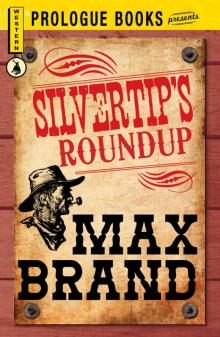 Silvertip's Roundup
Silvertip's Roundup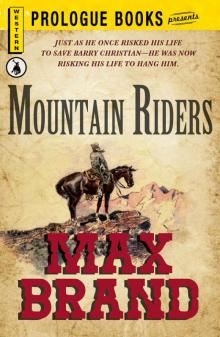 Mountain Riders
Mountain Riders Silvertip (1942)
Silvertip (1942)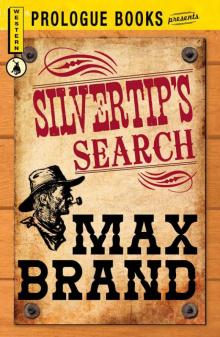 Silvertip's Search
Silvertip's Search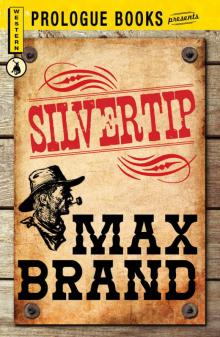 Silvertip
Silvertip Bull Hunter
Bull Hunter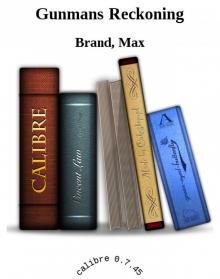 Gunmans Reckoning
Gunmans Reckoning The Seventh Man
The Seventh Man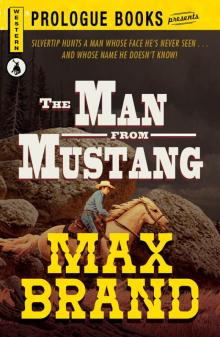 Man From Mustang
Man From Mustang Riders of the Silences
Riders of the Silences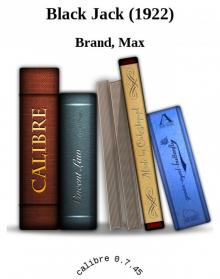 Black Jack (1922)
Black Jack (1922) Way of the Lawless
Way of the Lawless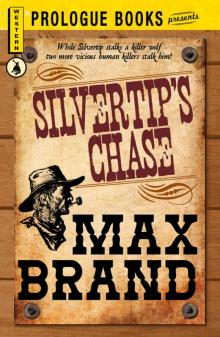 Silvertip's Chase
Silvertip's Chase Trailin
Trailin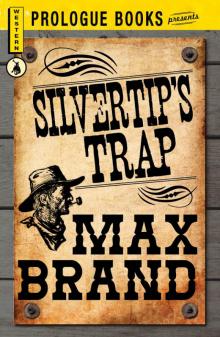 Silvertip's Trap
Silvertip's Trap Ronicky Doone (1921)
Ronicky Doone (1921) The Night Horseman
The Night Horseman the Garden Of Eden (1963)
the Garden Of Eden (1963)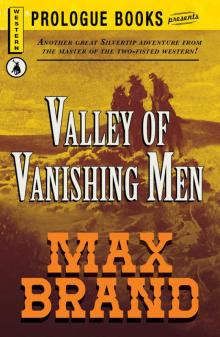 Valley of the Vanishing Men
Valley of the Vanishing Men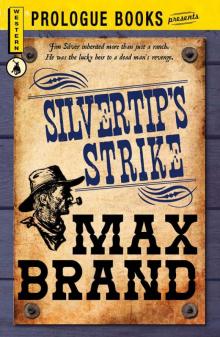 Silvertip's Strike
Silvertip's Strike Black Jack
Black Jack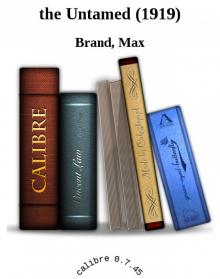 the Untamed (1919)
the Untamed (1919) Way Of the Lawless (1921)
Way Of the Lawless (1921) The Untamed
The Untamed